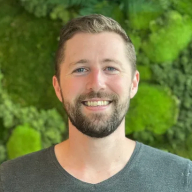
Luke Freeman 🔸
Bio
Participation7
From 2020-2024 I led the team at Giving What We Can (GWWC), a global community on a mission to make giving effectively and significantly a cultural norm.
Prior to GWWC my career later was mostly in tech start-ups, focusing on marketing and growth. I was on the initial team at Sendle, Australia’s first technology B-Corp, and co-founded Positly.
Beyond my work, I’m a devoted member of Giving What We Can (🔸10% Pledger #1560) and Founders Pledge, pledging to donate a significant portion of my income to effective charities.
I enjoy sharing my thoughts and experiences on effective giving and have had the pleasure to do so on platforms such as BBC Radio 4, Aussie Firebug, DW News, and hosting The Giving What We Can Podcast.
Posts 95
Comments296
Congratulations to Sjir! I'm thrilled for you, the GWWC team, and the EG community! I'm excited to see where you take the organisation and how it grows under your stewardship. Your incredible competence and deep commitment to effective giving were evident in the time we worked together and will serve you well in this role.
A big thanks to the boards and especially the CEO search committee for all their careful work in this selection process. I know how much time and attention went into making such an important decision. The thoroughness of your approach and the broad stakeholder engagement speaks volumes about your commitment to finding the right leader for GWWC's next chapter 🙌
Thank you for writing this comprehensive and candid post. As the ED/CEO of GWWC during this period, I deeply appreciate the transparency about both the challenges faced for us all during that period and reforms implemented. Some of the decisions, like the restrictive communications policy, were undoubtedly difficult and had real costs for the community, but I believe you and the team navigated an incredibly complex situation with integrity, putting in place important governance improvements while managing serious (and often unknown or unclear) legal risks.
I'm particularly grateful for the clear explanation of the trade-offs involved in various decisions. The section on crisis preparation really resonated with my experience - it's so much harder and more expensive to implement reforms during a crisis than to build robust systems proactively. The lessons around valuing operational experience, investing in capacity early, and carefully considering organisational risk profiles are especially valuable for other EA organisations.
While the FTX situation created immense challenges, I believe there's a silver lining in how it led to governance improvements across the ecosystem. The EV team's support during the spin-out process helped organisations like GWWC establish robust governance frameworks and operational systems from day one. Thanks to their guidance and the lessons captured here, I expect many of the spin-out organisations to emerge as particularly well-governed and resilient institutions.
I particularly want to acknowledge the immense effort of everyone who worked to reform EV during this period - both the visible leadership and the many staff members who put in long hours behind the scenes. This kind of operational and governance work isn't always celebrated in EA, but it's essential for building trustworthy institutions that can effectively pursue our shared goals.

Best. FAQ. Ever. 💸💸💸